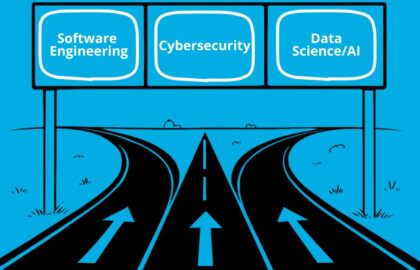This article on how to prepare for a data science job search while attending a bootcamp is part of the Coaching Collective series, featuring tips and expertise from Flatiron School Career Coaches. Every Flatiron School graduate receives up to 180 days of 1:1 career coaching with one of our professional coaches. This series is a glimpse of the expertise you can access during career coaching at Flatiron School.
Deciding to change careers to Data Science and enrolling in a bootcamp is a major life step. Whether you are attending full-time or part-time, and continuing to work or not during your studies, it’s a big change to adjust to! So congrats on committing and pat yourself on the back for moving toward the life you want.
But while you’re progressing through your studies, don’t forget to look ahead at what’s next – the job search. Don’t wait until graduation to start strategizing and working towards finding an opportunity! Instead, use the time and resources you have while attending your bootcamp to position yourself for success upon graduation.
Here’s how to prepare for a Data Science job search while still attending a bootcamp.
Reflect On Your Strengths and Interests
In a bootcamp, you’re learning at an accelerated pace. New material is introduced each week, and the relentless pace is kept up for weeks to get you industry-ready in a fraction of the time of traditional educational paths.
As you learn, take notes at the end of each week and reflect on the material and processes you use by asking yourself questions.
- Which activities did you enjoy?
- What was challenging for you and what was easy for you?
- Do you like cleaning data?
- Do you like dealing with enormous masses of messy data points?
- Do you like performing statistical analyses of data?
- Do you like conducting, testing, and maintaining architectures such as databases and large-scale data processing systems?
In addition to your experience with the technical “hard skills” associated with your discipline, think about any “soft skills” you’ve experienced as well.
- Do you like creating dashboards for different types of audiences?
- How do you like managing projects?
- Would you like to be a liaison with other departments or work to understand clients’ needs?
Knowing your answer to these questions will inform what type of role you might enjoy once you’re working as a Data Scientist in the industry and your eventual data science job search.
Consider Your Career Direction
Once you have an idea of what you are good at and what you enjoy, begin considering where these skills and passions could best be used in the workforce.
Talk To Instructors
Those that have walked the path before you are a great resource. Talk to your bootcamp instructors about how the skills and activities that you enjoy can translate to specific jobs. Their knowledge about the field is priceless, and when paired with their knowledge about you as a student, they may have some great recommendations.
Mine The Internet
Search online to find the different types of roles that are out there, such as Data Analyst, Data Scientist, Data Engineer, Business Analyst, Machine Learning Engineer, and more. While they may all deal with data, their day-to-day responsibilities can vary greatly.
For example, data analysts collect, process, and perform statistical analyses of data; while data scientists focus more on taking enormous masses of messy data points and using their skills in math, statistics, and programming to clean, massage, organize and model the data. While Data Engineers in many cases will develop, construct, test, and maintain architectures such as databases and large-scale data processing systems, data scientists pull relevant data sets from those databases for analysis.
Read job descriptions, determine which role’s daily activities sound the most interesting, and make a short list of job titles that you’d like to pursue.
Identify Skill Gaps
Once you’ve got an idea of which data-related jobs you might enjoy, it’s time to focus in on aligning your skill set. Look at job descriptions to see what skills are often required for these roles. That way, you can identify what you are strong at already and which you may need to develop further. Once you know what skills you would like to add to your toolbox, consider how you will obtain these skills, make a plan, and take action steps to obtain these skills.
Build A Targeted Portfolio
In your time at Flatiron School, you’ll have the opportunity to develop data-related projects based on a topic you pick yourself. But, before choosing a topic based on what others have done in the past, consider your interests and how you could highlight industries that interest you. Padding your portfolio with relevant projects can go a long way when interviewing potential employers.
For example, let’s say that Samantha has a strong interest in making sure that all people have access to good healthcare and she would like to work in the healthcare industry after graduation. Samantha could complete a data project on the comparison of accessibility and lack of accessibility in the healthcare system and how these data points reflect an overall average age of death. Once she starts interviewing, Samantha’s project will demonstrate her data skills and her passion for the industry.
Showcase the projects you create in your resume, cover letter, and in the “Featured” section of your Linkedin profile, and be prepared to discuss these projects and the steps taken to complete them during an interview.
Conclusion
There is always a ton of information to learn during a bootcamp. But, by being reflective throughout the process and taking action to set yourself up for success, once you graduate you’ll be better prepared for your job search. After all, knowing what type of role you want is half the battle.
About Laura Nicolaisen
Laura Nicolaisen is a Career Coach with Flatiron School. She has 15-plus years of experience as a career coach collaborating with recent graduates, professionals, and executives. In addition, Laura has over 15 years of experience working in the university and bootcamp setting, in such areas as admissions, student advising, coaching, and as an executive team member.




